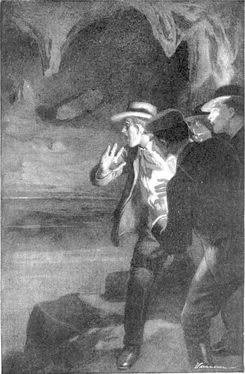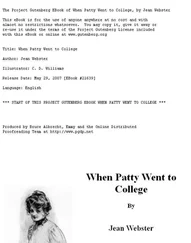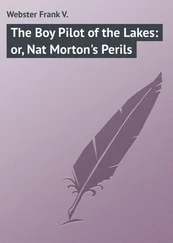Jean Webster - The Four-Pools Mystery
Здесь есть возможность читать онлайн «Jean Webster - The Four-Pools Mystery» весь текст электронной книги совершенно бесплатно (целиком полную версию без сокращений). В некоторых случаях можно слушать аудио, скачать через торрент в формате fb2 и присутствует краткое содержание. Жанр: Классический детектив, на английском языке. Описание произведения, (предисловие) а так же отзывы посетителей доступны на портале библиотеки ЛибКат.
- Название:The Four-Pools Mystery
- Автор:
- Жанр:
- Год:неизвестен
- ISBN:нет данных
- Рейтинг книги:3 / 5. Голосов: 1
-
Избранное:Добавить в избранное
- Отзывы:
-
Ваша оценка:
- 60
- 1
- 2
- 3
- 4
- 5
The Four-Pools Mystery: краткое содержание, описание и аннотация
Предлагаем к чтению аннотацию, описание, краткое содержание или предисловие (зависит от того, что написал сам автор книги «The Four-Pools Mystery»). Если вы не нашли необходимую информацию о книге — напишите в комментариях, мы постараемся отыскать её.
The Four-Pools Mystery — читать онлайн бесплатно полную книгу (весь текст) целиком
Ниже представлен текст книги, разбитый по страницам. Система сохранения места последней прочитанной страницы, позволяет с удобством читать онлайн бесплатно книгу «The Four-Pools Mystery», без необходимости каждый раз заново искать на чём Вы остановились. Поставьте закладку, и сможете в любой момент перейти на страницу, на которой закончили чтение.
Интервал:
Закладка:
"Oh, I've seen it a hundred times! It's character that tells. I've seen it happen to a political boss—a man whose business it was to make friends with every voter high and low. I've seen him forget, just once, and turn on a man, humiliate him, wound his pride, crush him under foot and think no more of the matter than if he had stepped on a worm. And I've seen that man, the most insignificant of the politician's followers, work and plot and scheme to overthrow him; and in the end succeed. The big man never knew what struck him. He thought it was luck, chance, a turn of the wheel. He never dreamed that it was his own character hitting back. I've seen it so often, I'm a fatalist. I don't believe in chance. It was Colonel Gaylord who killed himself, and he commenced it fifty years ago."
"It's God's own truth, Terry!" I said solemnly.
The sheriff had listened to Terry's words with an anxiously reminiscent air. I wondered if he were reviewing his own political past, to see if by chance he also had unwittingly crushed a worm. He raised his eyes to Terry's face with a gleam of admiration.
"You've been pretty clever, Mr. Patten, in finding out the truth about this crime," he acknowledged generously. "But you couldn't have expected me to find out," he added, "for I didn't know any of the circumstances. I had never even heard that such a man existed as that chicken thief—and as to there being two ghosts instead of one, there wasn't a suggestion of it brought out at the inquest."
Terry looked at him with his usual slowly broadening smile. He opened his mouth to say something, but he changed his mind and—with a visible effort—shut it again.
"Terry," I asked, "how did you find out about the chicken thief? I confess I don't understand it yet."
He shrugged his shoulders and laughed.
"Nothing simpler. The trouble with you people was that you were searching for something lurid, and the little common-place things which, in a case like this, are the most suggestive, you overlooked. As soon as I read the story of the crime in the papers I saw that in all probability Rad was innocent. His behavior was far too suspicious for him really to be guilty; unless he were a fool he would have covered up his tracks. There was of course the possibility that Mose had committed the murder, but in the light of his past devotion to the Colonel it did not seem likely.
"I had already been reading a lot of sensational stuff about the ghost of Four-Pools, and when the murder followed so close on the heels of the robbery, I commenced to look about for a connecting link. It was evident that Radnor had nothing to do with it, but whether or not he suspected someone was not so clear. His reticence in regard to the ha'nt made me think that he did. I came South with pretty strong suspicions against the elder son, but with a mind still open to conviction. The telegram showing that he was in Seattle at the time of the murder, proved his innocence of that, but he might still be connected with the ha'nt. I tried the suggestion on Radnor, and his manner of taking it proved pretty conclusively that I had stumbled on the truth. The ha'nt business, I dare say, was started as a joke, and was kept up as being a convenient method of warding off eavesdroppers. Why Jefferson came back and why Radnor gave him money are not matters that concern us; if they prefer to keep it a secret that's their own affair.
"Jeff helped himself pretty freely to cigars, roast chickens, jam, pajamas, books, brandy, and anything else he needed to make himself comfortable in the cabin, but he took nothing of any great value. In the meantime, though, other things commenced disappearing—things that Radnor knew his brother had no use for—and he supposed the workers about the place were stealing and laying it to the ghost, as a convenient scapegoat.
"But as a matter of fact they were not. A second ghost had appeared on the scene. This tramp negro had taken up his quarters in the spring-hole and was prowling about at night seeking what he might devour. He ran across Jeff dressed in a sheet, and decided to do some masquerading on his own account. Sheets were no longer left on the line all night, so he had to put up with lap robes. As a result, the spring-hole shortly became haunted by a jet black spirit nine feet tall with blue flames and sulphur, and all the other accessories.
"This made little impression at the house until Mose himself was frightened; then Radnor saw that the hoax had reached the point where it was no longer funny, and he determined to get rid of Jeff immediately. While he drove him to the station he left Mose behind to straighten up the loft; and Mose, coming into the house to put some things away, met ghost number two just after he had robbed the safe. If Mose's eyes looked as they did to-day I fancy the fright was mutual. The ghost, in his excitement, dropped one package of papers, but bolted with the rest. He made for his lair in the spring-hole and examined his booty. The bonds were no more than old paper; he tossed them aside. But the pennies and five-cent pieces were real; he lit out for the village with them. The robbery was not discovered till morning and by that time the fellow was at 'Jake's place' on his way toward being the drunkest nigger in the county.
"He stayed at the Corners a week or so until the money was gone, then he came back to the spring-hole. But he made the mistake of venturing out by daylight; the stable-men caught him and took him to the Colonel, and you know the rest.
"As soon as I heard the story of the beating I decided to follow it up; and when I heard of a jet black spirit rising from the spring-hole, I decided to follow that up too. At daylight this morning I routed out one of the stable-men, and we went down and examined the spring-hole; at least I examined it while he stood outside and shivered. It yielded an even bigger find than I had hoped for. Chucked off in a corner and trampled with mud I found the bonds. A pile of clothing and carriage cushions formed a bed. There were the remains of several fires and of a great many chickens—the whole place was strewn with feathers and bones; he had evidently raided the roosts more than once.
"When I finished with the spring-hole it still lacked something of six o'clock and I rode over to the village hoping to get an answer to my telegram. I wanted to get Jeff's case settled. 'Miller's store' was not open but 'Jake's place' was, and it was not long before I got on the track of my man. There was no doubt but that I had him accounted for up to the time of the thrashing; after that I could only conjecture. He had not appeared in the village again; the supposition was that he had taken to the woods. Now he might or he might not have come in the direction of Luray. All the facts I had to go upon were, a man of criminal proclivities, who owed Colonel Gaylord a grudge, and who was used to hiding in caves. It was pure supposition that he had come in this direction and it had to be checked at every point by fact. I didn't mention my suspicions because there was no use in raising false hopes and because, well—"
"You wanted to be dramatic," I suggested.
"Oh, yes, certainly, that's my business. Well, anyway I felt I was getting warm, and I came over here this morning with my eyes open, ready to see what there was to see.
"The first thing I unearthed was this story of the church social provisions. There had, then, been a thief of some sort in the neighborhood just at the time of Colonel Gaylord's murder. The further theft of the boots fitted very neatly into the theory. If the fellow had been tramping for a couple of days his shoes, already worn, had given out and been discarded. The new ones, as we know, were too small—he left them at the bottom of the pasture—and went bare-footed. The marks therefore in the cave, which everyone ascribed to Mose, were in all probability, not the marks of Mose at all. Actual investigation proved that to be the case. The rest, I think, you know. The Four-Pools mystery has turned out to be a very simple affair—as most mysteries unfortunately do."
Читать дальшеИнтервал:
Закладка:
Похожие книги на «The Four-Pools Mystery»
Представляем Вашему вниманию похожие книги на «The Four-Pools Mystery» списком для выбора. Мы отобрали схожую по названию и смыслу литературу в надежде предоставить читателям больше вариантов отыскать новые, интересные, ещё непрочитанные произведения.
Обсуждение, отзывы о книге «The Four-Pools Mystery» и просто собственные мнения читателей. Оставьте ваши комментарии, напишите, что Вы думаете о произведении, его смысле или главных героях. Укажите что конкретно понравилось, а что нет, и почему Вы так считаете.












